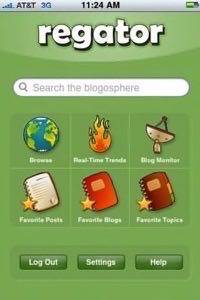Scott Lockhart used to tell his co-workers in the real estate industry that there was a lot of valuable information to be found by reading blogs. They, like all of us, would try blog search engines and end up frustrated with spam, abandoned blogs and low-quality content. So Lockhart quit his job and built an application he thought could solve that problem by unearthing just the most high-quality blog content concerning a wide variety of niche topics. In doing so, he stumbled onto one of the most important issues in the future of the web – the tension between controlled user experience and chaotic freedom.

That sounds crazy, but Lockhart’s now three-person Atlanta company has actually done a remarkably good job of unearthing good content in a compelling user experience. Regator offers users a curated collection of high-quality sources on more than 500 topics, everything from martial arts to ceramics, aviation, cheerleading, law and Antarctica. Of course there are tech and business channels, too. Regator just got its $2 premium iPhone app into the iTunes store and it’s the best “channel clicker” for niche content we’ve seen yet.
There’s something a little bit odd about having the borders of your internet limited by someone else, but the Regator user experience is excellent otherwise. It’s well designed and fun to use. User experience is key to making the web…usable. I’ve wished for years that more people got excited about sharing
files, bundled collections of dynamic RSS feeds, but that just hasn’t happened.
Curation, bundles of content, discovery – these are functions of a prolific web that a new crop of services is trying to tackle with good design and tough decisions about openness versus…something else. Regator is an interesting entry into this place of tension and possibility.
The new premium iPhone app offers subscription to the selected blogs you like, video viewing, recommendations of related posts and issue tracking by keyword search. You can view the most recent posts from sources, or the most popular posts with other Regator users.
But is this just a pretty looking walled-garden? Regator brings to mind an admittedly paranoid but important blog post that consultant Chris Messina wrote this week called The Death of The URL.
“I see signs that the essential freedoms of the web are being undermined by a cadre of companies through the introduction of new technologies and interfaces that, combined, may spell the death of the URL…As a user experience designer, [the responsibility lies with] my discipline and peers to provide the right kind of ideas and leadership. If we get the design right, we can empower while clarifying; we can reduce complexity while enhancing functionality; we can expand freedom while not overwhelming with choice. Surely these are the things that good, thoughtful user experience design can achieve!
“If I were forced to choose between all the messiness of free will over the ‘comfortability’ of a contrived existence, I’d choose the red pill, time and time again. And I hope you would too.
From WebTV to the tightly controlled iPhone app platform, though – these interfaces can be very compelling to use. One of the risks of a controlled platform, perhaps secondary to the inherent loss of freedom, is that whoever is in control might not do a good job of picking out what shows up. Editorial control risks conflicts of interest and a lack of broad editorial knowledge compared to what topic experts know. It’s not an easy role to play.

Kimberly Turner is the editor of Regator’s selection of blogs. She’s a former magazine writer and she works with volunteer reporters and editors who suggest top blogs in niches when they have free time. Turner doesn’t believe that Regator is guilty of the sins that Messina calls other companies out for.
Whether you’re finding sites through Google’s algorithm, the community votes at Digg or your friends on Twitter “we all use some service or site to help us find what we’re looking for,” Turner says “and those are all ‘curated’ in some way.”
“Regator’s human-powered curation is simply less likely to yield poor quality content than some others’,” Turner contends.
Thousands of blogs are included on Regator already and Turner says new features like related posts and searches help users “explore and wander into fresh territory rather than getting stuck in a rut and going to the same small subset of blogs repeatedly.”

So far there are 20 blogs in the wine category for example, just 1 in the beauty/nails subcategory, 4 hockey blogs, 22 law blogs, 3 blogs about cheerleading and 7 about Emergency Medical Services.
The service adds new sources based on user suggestions and other discovery methods. Turner says, “once a blog has established itself as a well-written and trustworthy source, we want to make sure it is included.” The fact is, though, that if a blog Regator turns you on to then links to another related blog that’s not included in the Regator index – you as a user cannot subscribe to it. If the company offered a “suggest” button next to its “share” button in the Regator browser, that could be helpful.
Does that sound reasonable? It’s not as free-form and dynamic as other services. Collected.info, a new service for sharing and subscribing to other peoples’ collections of feeds, is a particularly interesting recent entrant into this market from perhaps the other end of the spectrum. Both services take a little time to get your reading list set up well, but Regator delivers high-quality content from the start.
I like Regator and am already using the new iPhone app to discover interesting new content while on the go. A service that gives me access to fresh, high-quality content about ceramics, anthropology and museums with just a few clicks? Sign me up!
Still, there’s something about the sources available being limited by someone else’s choice. It’s an interesting tension that may never be resolved – but is the basis for some very interesting software in the meantime. The Regator crew is right to identify as a problem the way people new to this social web struggle to find the best content. They offer a compelling solution to the problem. Time will tell which solutions catch on and what the consequences will be.
We’d like to take this opportunity to thank one of the companies that makes it possible for us to bring ReadWriteWeb to you.
Groupsite is a long-developed, feature-rich, self-serve, professional grade social networking and collaboration service. If you’ve got a group of people you want to facilitate online conversation between – you should check out Groupsite. We really appreciate Groupsite’s support here at ReadWriteWeb.










